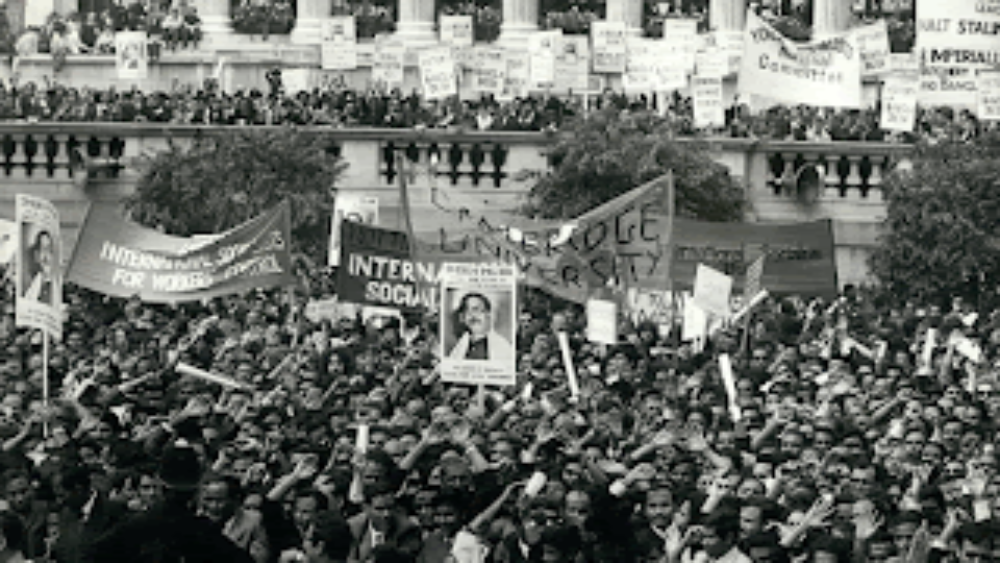Shaikh Mujib Ur Rahman: A Traitor??

Ten years ago today, Oxford University Press published a book called “Incomplete Memories”. This book is actually a collection of four notebooks of Shaikh Mujibur Rehman’s memoirs which he wrote down in 1967 while in prison. The best part of this book is what Sheikh Mujib did not write, but the outline of his political life which is included as an opening in the book. Only facts related to life have been collected so that the reader can easily understand the context. Some facts have been collected here so that the forgotten story of the breakup of the country can be refreshed in our minds and the youth can know that Sheikh Mujib, whom we considered as a traitor in ‘false Pakistan’, was he really entitled to this title or the real one. The traitor was someone else!
It may be known to few people that Sheikh Mujib presented his six points for the first time in Lahore. On February 5, 1966, a meeting of the opposition parties was held in Lahore, where Mujib presented his six-point plan. The next month, Sheikh Mujib was elected as the president of the Awami League, after which he conducted a nationwide campaign to smooth public opinion on the six points. When the general elections of 1970 were announced, the Awami League also decided to participate in them. On June 7, Sheikh Mujib made a speech in a rally at the Race Course Ground and made it clear that his party would contest the elections on the basis of six points. Let the people vote for him keeping the six points in mind. This shows that the six points were part of Mujibur Rehman’s election campaign from day one and the irony is that General Yahya never bothered to read them.
However, on December 7, general elections were held on the basis of adult voting for the first time in the entire country, in which the Awami League won 167 seats out of 169 in East Pakistan and thus emerged as the largest party in United Pakistan. On January 3, 1971, Mujib took an oath to the members of the Awami League at the race course ground that they would form the framework of the constitution on the basis of six points. On January 5, Zulfiqar Ali Bhutto, the leader of the majority party in West Pakistan, agreed to form a government at the center with the Awami League.
In this context, the leaders of both parties met in Dhaka on January 27, but the negotiations that continued for three days failed to yield any results. Finally, on February 13, President Yahya woke up from his sleep and convened the newly elected National Assembly on March 3 in Dhaka. This was a turning point, on this occasion Zulfiqar Ali Bhutto boycotted the meeting of the National Assembly on February 15 and announced that the power in East and West Pakistan should be handed over to the majority parties there. Awami League reacted very strongly to this announcement and Sheikh Mujib called this demand illogical and said that “Now the source of power is the people of East Pakistan.”
On March 1, President Yahya suddenly dissolved the National Assembly. The convened meeting was adjourned, on which excitement arose in East Pakistan and an unceasing series of protests began. The Awami League called for a nationwide strike on March 3, to which the people of East Pakistan responded. After the successful strike, Sheikh Mujib demanded that President Yahya immediately transfer power to his party in light of the election results. On March 7, Sheikh Mujib gave his famous Zamana speech, in which he said that now this struggle is a struggle for freedom from slavery.
If we look at the history, it is known that after the day that the National Assembly was adjourned by the President, on March 7, the writ of the government on East Pakistan ended and Sheikh Mujib’s order came into effect there. In the words of the book, I wrote, “On one side were the orders of Yahya Khan and on the other side were the instructions of Mujibur Rahman issued from 32 Road, Dhan Mandi. The entire nation followed Mujibur Rahman’s instructions. Every institution including government offices, courts, insurance companies, schools, colleges, mills, factories obeyed his orders. The strong response shown by the people of Bangladesh to his appeal is unprecedented in the history of the region. In fact, Mujibur Rahman ruled an independent Bangladesh from March 7 to March 25.”
After that, the military operation started in East Pakistan, the unfortunate thing is that no voice was raised from West Pakistan in opposition to that operation (there are some exceptions). Ur Rehman announced the independence of Bangladesh, on the same day General Yahya banned the Awami League and called Sheikh Mujibur Rehman a traitor in his speech. On December 16, 1971, this drama reached its logical conclusion when General Niazi surrendered to the Indian general at the Dhaka race course and signed the humiliating document of defeat.
Whenever I read the events of 1970 and 1971 continuously, I think that what was the fault of Sheikh Mujib whom we used to call a traitor? Didn’t the people of Pakistan make him successful in the most number of seats and shouldn’t the power be transferred to the Awami League according to the principles of democracy? If the answer to these things is yes, then we should ask ourselves under what logic we call Sheikh Mujib a traitor!

[…] حاصل کرنے میں کبھی مدد نہیں کر سکتے، لیکن وہ ایک روادار جمہوریت کے طور پر اس کی ساکھ کو ہمیشہ کے لیے داغدار کر دیں […]